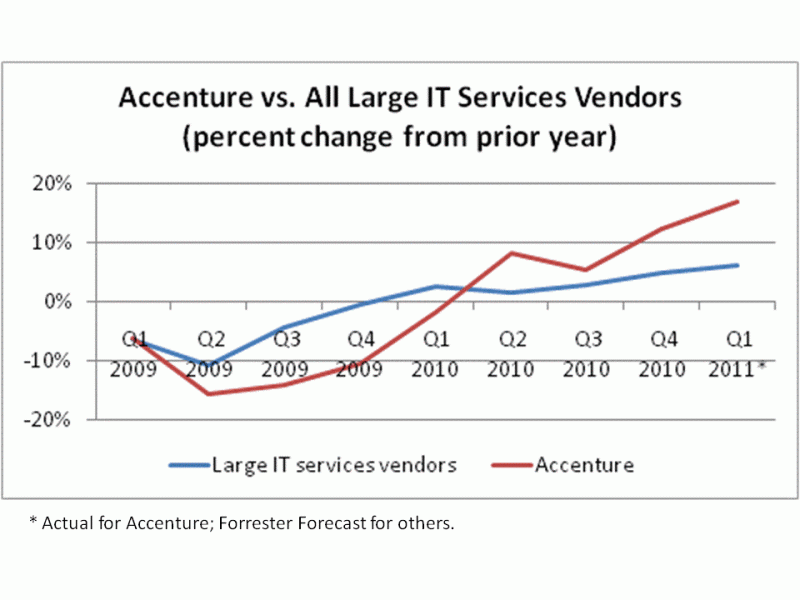Q1 2011 Results For Accenture And Oracle Point To Strong 2011 For IT Services And Software
On March 24, 2011, both Accenture and Oracle released better-than-expected financial results for their fiscal quarters ending in February 2011. In both cases, revenue growth was stronger than expected, with Accenture's revenues up 17% and Oracle's reported revenues up 37%. Note, though, that Oracle's reported revenues were measured against a period in which it recorded only one month's of Sun Microsystems' revenues following the completion of that acquisition; adjusting the base period to show a more complete picture of the Sun revenues (which we estimate at about $1.8 billion in the three months ending in February 2010, compared with the reported $458 million), Oracle's revenues were 13% higher. Still, its software and services revenues were up a strong 19%.
Because their fiscal quarters end one month earlier than most other vendors, Accenture and Oracle serve as early indicators of how the IT services and software segments of the tech market do each quarter. The 27% increase in license revenues for Oracle's database and middleware products and the even stronger 34% growth in its application license revenues are signs of growing demand for software products — not just SaaS products, but also classic licensed software products. Purchases of those products typically lead to purchases of systems integration consulting services from IT services vendors like Accenture. And indeed Accenture reported 20% growth in revenues from consulting services, compared with more modest (but still good) 13% growth in its outsourcing businesses. So, my expectations that software and IT services will be the leading tech market growth categories in 2011 are supported by these results.
However, the financial results for other software and services vendors are unlikely to match the strength of Oracle's and Accenture's revenue growth. SaaS vendors like salesforce.com and smart computing software vendors like TIBCO, Informatica, and PegaSystems could equal or exceeed Oracle's software growth rates, while Indian services vendors like Cognizant, Infosys, Tata Consultancy Services, and Wipro may outpace Accenture. But most large vendors won't do better, because in recent quarters both Oracle and Accenture have growtn faster their categories. For example, Oracle's growth was very similar from q3 2009 to Q2 2010 to the growth of total revenues for the 22 large softwre vendors we track, but since then Oracle's revenues have grown at a faster clip.

Similarly, while Accenture's growth was actually worse in 2009 and Q1 2010 than the growth rates for total revenues of the 2o large IT services revenues we track quarterly, its growth since then has been stronger.

In short, I don't expect overall software in Q1 2011 to grow by Oracle's 19% or IT consulting and systems integration services to grow by Accenture's 2o%. But I do think revenue growth in both these categories will exceed 10%.
